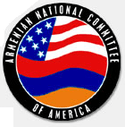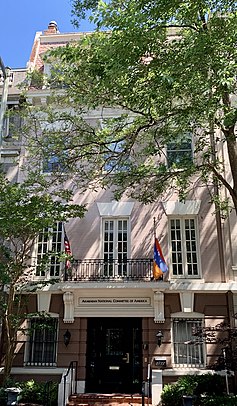Armenian National Committee of America
The Armenian National Committee of America (ANCA) (Armenian: Ամերիկայի Հայ դատի յանձնախումբ) is the largest and most influential Armenian American grassroots organization. Working in coordination with a network of offices, chapters and supporters throughout the United States and affiliated organizations around the world, the ANCA actively advances the concerns of the Armenian American community on a broad range of issues.
 | |
| Formation | 1918 (as ACIA) 1941 (as ANCA) |
|---|---|
| Type | NGO |
| Headquarters | 1711 N Street NW, Washington, D.C. |
Official language | English, Armenian |
Executive director | Aram Hamparian |
Chairman | Raffi Hamparian |
| Website | www |
Formerly called | American Committee for the Independence of Armenia (ACIA)[1] |

History
The ANCA was founded as ACIA in 1918 and was founded as the ANCA in 1941. The ANCA is an outgrowth of the American Committee for the Independence of Armenia (ACIA) which was founded after World War I by Vahan Cardashian, the former Consul of the Ottoman Empire in Washington. Many prominent American and Allied leaders including James W. Gerard, the U.S. Ambassador to Germany, Senator Henry Cabot Lodge, Charles Evans Hughes (later appointed Chief Justice of the U.S. Supreme Court), Elihu Root and others participated to this organization. The goal of ACIA was the independent Wilsonian Armenia. The ACIA had a Central Office in New York City and 23 regional offices in 13 states.
Later, these offices gradually evolved into the Armenian National Committee of America, which expanded its activities to include public relations efforts to acquaint local communities about Armenian issues including the Armenian Genocide and Armenian National aspirations. Other activities included April 24 commemoration activities, public forums, voter registration efforts, support for local and state political candidates, and updating the local community on Armenian issues.
The ANCA is active in different areas of political and educational activities, including:
- initiating the legislation on issues of concern to the Armenian American community, such as strengthening Armenia as a secure, prosperous and democratic state; supporting Nagorno Karabakh's right to self-determination and independence within secure borders; etc.
- participation in the American electoral process at the federal, state, and local levels by educating elected officials about Armenian American issues and providing Armenian American voters with up-to-date information about the positions of candidates on Armenian American concerns.
- publication of congressional testimony, position papers, press releases, fact sheets, and regional newsletters.
Beyond the national headquarters of the ANCA located in Washington, there are two regional offices in New York City and Los Angeles, and more than fifty local chapters and thousands of activists,[2] it is cooperating with a large web of regional Armenian National Committees (or Armenian Cause/Hay Tad Offices) in Armenia, Russia, France, the Middle East, Canada, South America, and Australia.
Since the early 1990s, the ANCA has defended Section 907 of the Freedom Support Act, restricting aid to the government of Azerbaijan.
The ANCA was among the major organizations backing US House Resolution 106 which called for the United States to recognize the Armenian Genocide committed by the Ottoman Empire during World War I.
The Chairman of ANCA is Raffi Hamparian. The staff is composed of Executive Director Aram Hamparian, Communications Director Elizabeth S. Chouldjian, Government Affairs Director Raffi N. Karakashian, Esq., and Chief Financial Officer Christopher Hekimian.
On May 25, 2017, the ANCA issued a statement against Donald Trump's budget, which would cut 69.6% of the aid to Armenia. The ANCA stated: "We are troubled by Trump's ill-advised and misguided proposal to cut aid to Armenia."[3]
References
- "Heather S. Gregg, Divided They Conquer: The Success of Armenian Ethnic Lobbies in the US" (PDF). Archived from the original (PDF) on 2017-10-11. Retrieved 2012-04-03.
- ANN/Groong - DiasporaConf99: ANCA's Address Archived March 4, 2016, at the Wayback Machine
- "ANCA: 'We are Troubled by Trump's Ill-Advised and Misguided Proposal to Cut Aid to Armenia'". The Armenian Weekly. May 25, 2017. Retrieved May 26, 2017.